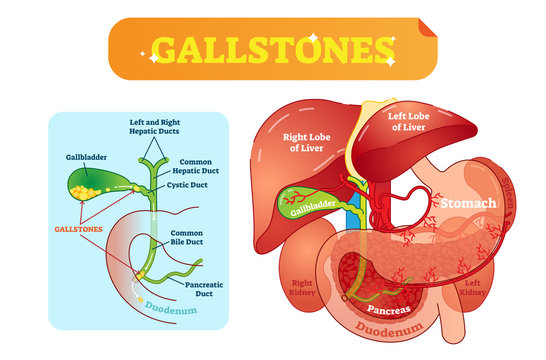Estimated reading time: 0 minutes
Gallstones, a prevalent issue within the gallbladder, impact countless lives globally, leading to varying degrees of discomfort and necessitating medical care for many. Amidst factors like genetics and body composition, nutrition stands out as a critical element in the development, management, and prevention of gallstones. This exploration merges Ayurvedic insights with contemporary understanding, offering a holistic view on dietary practices beneficial for gallbladder health and gallstone prevention.
Understanding Gallstones through Ayurveda
From an Ayurvedic standpoint, gallstones are seen as a manifestation of aggravated doshas, primarily Pitta, which is associated with metabolism and bile production. An imbalance in Pitta can lead to excessive formation of bile constituents, like cholesterol and bilirubin, resulting in gallstones. The balance between asymptomatic and symptomatic gallstones is key, with the latter often requiring comprehensive treatment.
Nutritional Influences on Gallstone Formation
Dietary Fats: Ayurveda emphasizes the importance of balancing saturated and unsaturated fats, advocating for a diet that moderates the former and encourages the latter to maintain optimal bile composition and flow.
Fiber: A cornerstone of Ayurvedic nutrition, a high-fiber diet supports digestive health and can significantly impact bile chemistry, reducing the likelihood of gallstone formation.
Carbohydrates: Ayurveda advises moderation in refined carbohydrates and sugars, promoting whole grains and complex carbs that do not exacerbate insulin resistance or contribute to unhealthy weight gain.
Body Weight Management: Consistent with Ayurvedic principles of balance, managing body weight through a healthy diet and lifestyle is essential in minimizing gallstone risks.
Hydration: Ayurveda stresses the importance of adequate hydration for maintaining digestive health and ensuring fluid bile, a key factor in preventing gallstone formation.
Ayurvedic Dietary Recommendations for Gallbladder Health
Incorporating Ayurvedic dietary principles involves focusing on foods that balance Pitta dosha. This includes cooling foods like cucumbers and melons, whole grains, legumes, and lean proteins. Healthy fats, such as those found in ghee (clarified butter), nuts, and seeds, are encouraged in moderation.
Integrating Ayurvedic Practices with Nutritional Management
Gradual Weight Loss: Aligning with Ayurvedic teachings on balance, gradual weight management is preferred over rapid weight loss methods to prevent gallstone risks.
Fiber-Rich Diet: Emphasizing fiber-rich foods such as fruits, vegetables, and whole grains aids in digestive health and supports proper bile function.
Moderate Coffee and Alcohol Consumption: While Ayurveda typically advises against excessive intake of stimulants, it recognizes the importance of balance and moderation in all things, including diet.
Conclusion
Merging Ayurvedic principles with modern nutritional science offers a comprehensive approach to managing and preventing gallstones. A diet that balances the doshas, particularly Pitta, along with lifestyle choices that promote overall health, can significantly reduce the risk of gallstone formation. Consulting with healthcare and Ayurvedic professionals ensures personalized and effective management strategies, empowering individuals to maintain gallbladder health through informed dietary choices.
Related-
Know More About Ayurveda Treatments For Gallbladder & Gall Stones.
GET IN TOUCH


Recent comments